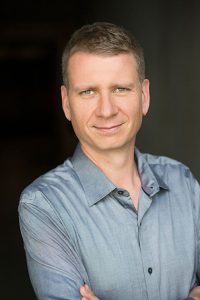

Craig Holzschuh. Photo credit: Emily Cooper.
A graduate of UBC and the University of Ottawa, Craig has worked in professional theatre for over 25 years as a director, playwright, actor and designer. From 2001 to 2016, Craig was the Artistic and Managing Director of Théâtre la Seizième in Vancouver. Under his leadership, the company’s scope and notoriety increased greatly, as both producing and presenting programming expanded significantly to reach record amounts of audience members. During that time, his most notable directing credits include Michel Tremblay`s A toi, pour toujours, ta Marie-Lou, David Paquet`s Porc-épic, Traces, which he co-created with Anita Rochon, George F. Walker`s L’enfant-problème, Michel Nadeau’s Lentement la beauté, Gilles Poulin-Denis`s Statu Quo and Michael Gauthier’s Mathieu Mathématiques. Craig is the first director to be awarded Jessie Richardson Awards for his directing work in the Large Theatre, Small Theatre and Theatre for Young Audiences categories. Along with these accolades, Craig received the John Moffat and Larry Lillo Award as well as le prix Marcus-Banque Nationale for his exceptional contribution to the theatrical communities in French-Canada. From 2006-2010, Craig was the president of l’Association de Théâtres francophones du Canada. In 2016, Craig joined the Canada Council of the Arts in Ottawa, where he currently is an Officer in the Engage and Sustain Program working with theatre companies from across the country.
I think that my time at UBC was about opportunity. Not only was I given the opportunity to direct public exercises, plays, both small and large scale, operas – yes, operas!- , dramaturge new works and teach, I was introduced to many different types of directing styles and views on theatre. Now, it would be dishonest of me to say that each of these styles and views was my cup of tea, but they did force me to explore them fully before integrating or discounting them from my practice. At the time, the constant flow of new information seemed overwhelming and exhausting, but, over time, I realized that it provided me the tools to continuously build on the solid foundation I had started at UBC. If I have had any sort of success as a director, I owe a large part of it to the time I spent at UBC.


